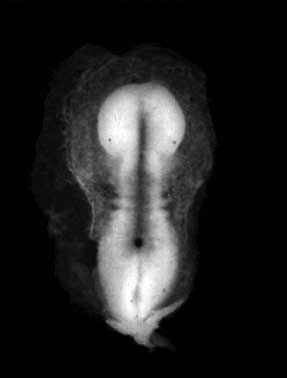Carnegie stage 9: Difference between revisions
No edit summary |
No edit summary |
||
| Line 1: | Line 1: | ||
[[Image:Stage9 dorsal.jpg|left]] | |||
Features: embryonic disc, primitive node, primative streak, primative groove, somites, neural groove, brain plate region, connecting stalk, cut edge of amnion | Features: embryonic disc, primitive node, primative streak, primative groove, somites, neural groove, brain plate region, connecting stalk, cut edge of amnion | ||
Revision as of 22:12, 5 August 2009
Features: embryonic disc, primitive node, primative streak, primative groove, somites, neural groove, brain plate region, connecting stalk, cut edge of amnion
Facts: Week 3, 19 - 21 days, 1.5 - 2.5 mm, Somite Number 1 - 3
View 1: embryonic disc, showing the epiblast viewed from the amniotic (dorsal) side.
Stage 9 Labelled | Stage 9 Molecular | Stage 9 SEM | Stage 10
Events: Ectoderm - Neural plate brain region continues to expand, neural plate begins folding over the notochord. Mesoderm - segmentation of paraxial mesoderm begins (1 - 3 somite pairs), cardiac primordium forms
Identify: neural groove and neural folds, the mesoderm, which segments beside the neural groove to form somites but extends laterally to margin of embryonic disc lateral plate mesoderm, where it merges with the covering extraembryonic mesoderm.
The intra-embryonic coelom develops in the middle of the lateral plate mesoderm. Note amniotic ectoderm covered by extramebryonic mesoderm (empty spaces above and below the mesoderm are artefacts, as are the lateral folds in the ectoderm).
View 2: embryonic disc, showing the epiblast, connecting stalk and brain fold.
Image source: Embryology page Created: 19.03.1999
Carnegie Stages Link
1 | 3 | 7 | 8 | 9 | 10 | 11 | 12 | 13 | 14 | 15 | 16 | 17 | 18 | 19 | 20 | 21 | 22 | 23
About Carnegie Stages
Carnegie stages are named after the famous US Institute which began collecting and classifying embryos in the early 1900's. Stages are based on the external and/or internal morphological development of the embryo, and are not directly dependent on either age or size. The human embryonic period proper is divided into 23 Carnegie stages. Carnegie stages are based on the external and/or internal morphological development of the embryo, and are not directly dependent on either age or size. Criteria beyond morphological features include age in days, number of somites present, and embryonic length.
The Kyoto Collection images are reproduced with the permission of Prof. Kohei Shiota. Scanning electron micrographs of the Carnegie stages of the early human embryos are reproduced with the permission of Prof Kathy Sulik. Images are for educational tutorial/revision purposes and cannot be reproduced electronically or in writing without permission.
UNSW Embryology Links
Glossary Links
A | B | C | D | E | F | G | H | I | J | K | L | M | N | O | P | Q | R | S | T | U | V | W | X | Y | Z
- Dr Mark Hill 2009, UNSW Embryology ISBN: 978 0 7334 2609 4 - UNSW CRICOS Provider Code No. 00098G
